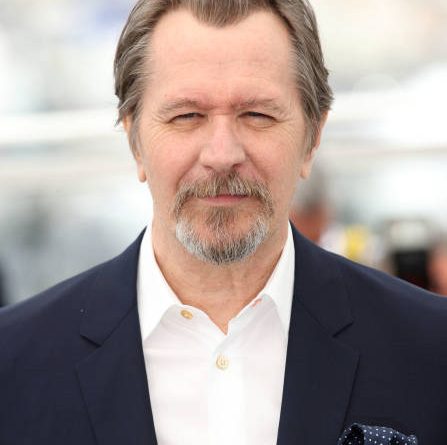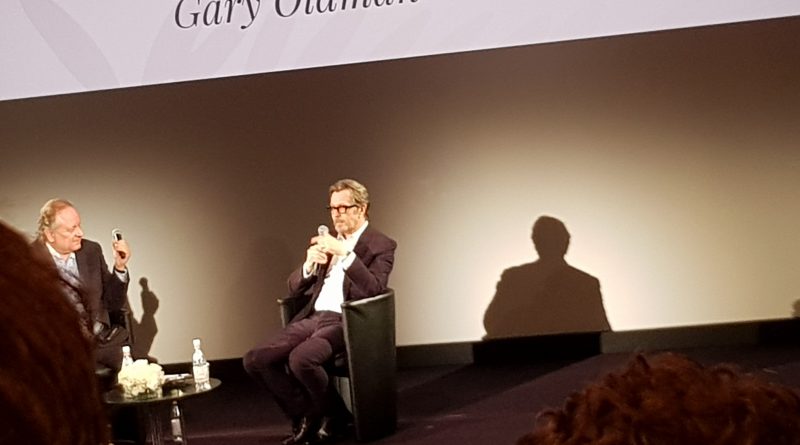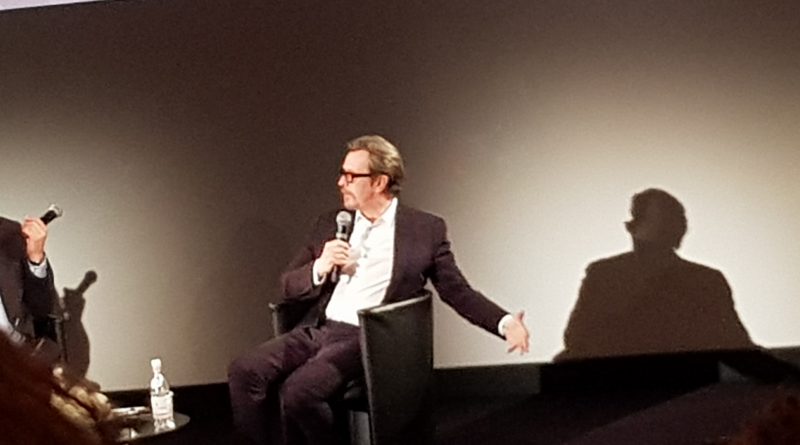Friday Film : Cannes 2018: Gary Oldman
CANNES 2018: Gary Oldman
I’ve been lucky enough to get into all the masterclasses at Cannes this year and I’ve also been at screenings where legends like Jane Fonda have showed up. They all received great ovations but the welcome for Gary Oldman was nothing short of rapturous. For an actor who has never courted tabloid celebrity this is an indication of the high regard he is held in, simply because of his talent. Although the biggest cheers during his film reel shown at the beginning of the talk were for the clips of him as Sirius Black in the Harry Potter films, the audience recognized and appropriately acknowledged the other roles even if they had been in small films. This audience knew the work of the man they had come to see.
He was introduced as a man who is always interested in ‘artistic excellence’. Over the next hour and a half he articulated his passion for his chosen profession with humour and down to earth tips.
It’s difficult to fully capture the full essence of a speaker’s personality and words after a lengthy session but here are some highlights:
On coming across his old films when channel surfing: I tend to switch the channel, not because I’m embarrassed by anything I’ve done but because it’s old work. I often get asked what my favourite role is that I’ve played and I always say, my next one.
When he decided to become an actor: I remember the moment vividly. I was about 14 and a film came on television; The raging moon directed by Brian Forbes starring Malcolm Mc Dowell. There was such a vulnerability about him in his eyes but also an air of menace. For me that’s the cocktail that decides why you like certain actors above others; that mix of vulnerability and menace. The lights in the room just grew brighter as I watched him and I decided it was what I wanted to do.
I asked around and eventually ended up at a theatre company. I was self motivated. There was no Internet then, nothing interactive, no videos to watch. There were only books you could read, so just went out to where I thought something could happen. I made enquiries and looked up things in the yellow pages. I wrote to people. I was industrious. I’d always been like that. I had a newspaper round when I was 8, I saved up the money I earned to buy music. I’d see a new David Bowie album and work out how many weeks it would take me to be able to buy it.
My dream was to go to RADA. They turned me down and told me to try my hand at something else. I was devastated. All my heroes like Peter O’Toole and Alec Guinness had gone to RADA. But I got into another drama school. We did everything there, mime, fencing, stage fighting. It was a discipline and I’ve used what I learnt there in the years since on different projects.
His tip for budding actors: Know your lines and turn up early. Not on time, early.
The importance of his early theatre work: It was invaluable. I had great writing to work with and did all types of plays. Film was never a consideration, it was all theatre and radio. Films were for people like De Niro and Gene Hackman.
On turning work down: I think it’s part of my process! I turn almost everything down initially! The first film I turned down was The Bounty with Anthony Hopkins and Mel Gibson. I preferred to stay in theatre, the writing was better. But the more I said no, the more they came back with more money! It’s a good trick to pull.
I turned down My Beautiful Launderette by Stephen Frears. I didn’t find it convincing. I’m from South London and I said that’s not how people from there speak or behave. Anyway another actor took the role, don’t know who (laughs) (it was Daniel Day Lewis against whom Oldman has often been pitted – the working class boy v the public school, posh boy).
Syd and Nancy: It’s not my favourite of what I’ve done because I don’t think I’m very good in it. I also wasn’t very interested in it initially and turned it down. Punk had passed me by. I was a soul/funk, James Brown guy. But I was offered $35000 for it and when you’re earning $33 per week in the theatre you think for 35000 I could get my kitchen done! So I immersed myself in the punk world and when you do that it grabs you.
Films then and now: When I started you got a date to shoot and that’s when it happened. You could plan your other work around it. There were no reshoots, no last minute changes like there are now.
Prick up your ears: I was surprised when Frears came back to offer me this after I’d turned down his other script. I filmed it during the day while I was doing theatre at night. I was doing 5 different plays. I’d get up at 5am, paint my flat, film then go do my plays in the evening. It was crazy. Just thinking about it now makes me want to take a nap!
Playing Dracula: I turned it down at first, ofcourse but I was intrigued by the idea of Coppola directing it. I read that line ‘I have crossed oceans in time to find you’ and knew I had to do it. Who wouldn’t want to say that line to someone, though not necessarily Winona Ryder! In preparing for the role the voice came first. I wanted to lower my voice an octave so I worked with an opera singer. You try everything, you whisper the lines, sing them, say them out loud.
The film that he was most impressed to be in: I had to pinch myself when I first saw JFK and tell myself, I’m in this. Holy shit, I’m actually in this film. It’s such a powerful film. Oliver Stone made me an investigator in that he sent me off to meet people who had known Lee Harvey Oswald so I could become him. It was a gift to be able to do that. Yes, it’s an acting gig but I’ve been at that window with a rifle from which it’s said Oswald fired the bullet that killed JFK. What an experience. We shot at the actual locations, that’s extraordinary. Today you’d film it in Bulgaria or somewhere. We had 2 scripts, the one we gave the mayor and government which said ofcourse Oswald did it and the real script we actually shot from which said it was a conspiracy!
Playing real characters v fictional ones: With real people you have a responsibility to the memory of the person and his family because your choices as an actor will affect them. Whether it’s Oswald or Churchill.
With fictional characters there might be an existing fanbase and you have to respect that too.
Either way you sit at home and practice the voice, the mannerisms. It’s kitchen acting. Basically you do your homework.
Working with Christopher Nolan: In 7 years of working with him he gave me one note – it said ‘there’s little more at stake’, let’s try that again! You think he’s doing so little then you see the results and think what a clever bastard!
On feeling a director has wrong take on a scene: you’re not there to be combative. You say, I have an idea. You have to remember it’s not all about you and your character. It’s about the lighting, the other actors, everything.
On acting: I love acting. I love watching good acting. I like to be surprised and think how did he do that?
On directing: It’s a great joy. It’s a job that oversees all the arts, music, costume design, writing, everything. I feel privileged to do it.
Great roles: you can’t sit around waiting for great roles. They come maybe every 5-6 years. It was years for me between Beethoven or Dracula or Churchill but you have to pay the bills so you look for other stimulus. Like writing. Until I did I thought I couldn’t do it. It’s like that with anything. Until you do it, you think you can’t.
(Gary also spoke about the great anxiety he suffered when he took on the role of George Smiley, following in the footsteps of his idol Alec Guinness. Short clips of that can be found on @itsalawyerslife on twitter and Instagram)
Click here to report this email as spam.



